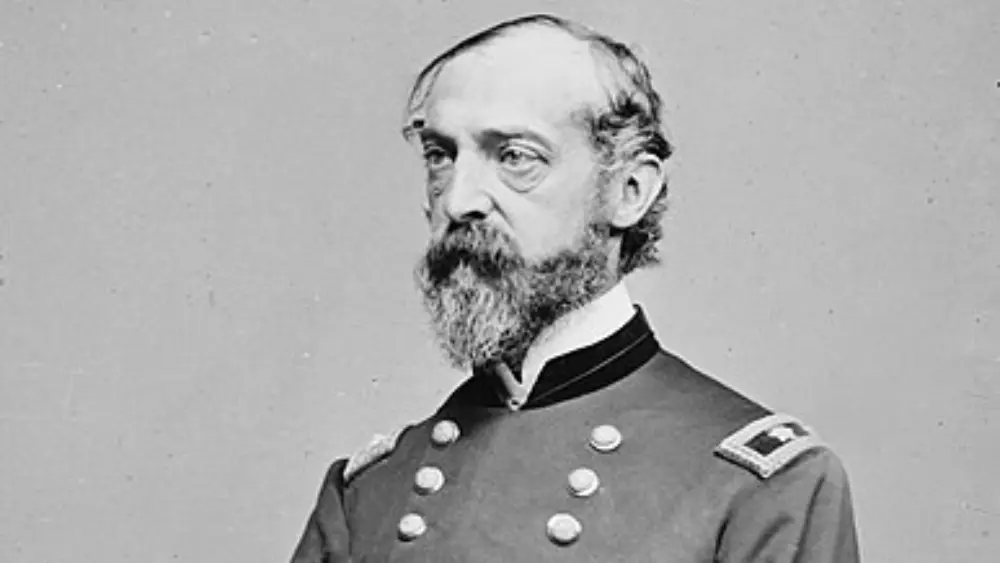George Gordon Meade, born on December 31, 1815, in Cádiz, Spain, was a distinguished American military officer who played a pivotal role in the American Civil War. He is best known for his leadership during the Battle of Gettysburg, which is often considered a turning point in the conflict. Meade’s strategic brilliance and resolute command earned him a place in history as the general who saved the Union.
Early Life and Military Career
George Meade’s early life was steeped in a rich tradition of military service. Born into a family with a deep commitment to the armed forces, he inherited a legacy of duty and honor. His father, Richard W. Meade, was a wealthy merchant and naval agent who faced financial difficulties, forcing the family to return to the United States from Spain. Despite these setbacks, Meade pursued a path of service and discipline.
He graduated from the United States Military Academy at West Point in 1835, ranking 19th in a class of 56 cadets. This educational foundation marked the beginning of a distinguished military career that would ultimately shape the course of American history.
As he embarked on his path, Meade’s military service included a notable tenure in the U.S. Army Corps of Topographical Engineers. This role not only allowed him to contribute to the nation’s infrastructure and exploration efforts—including surveying the Great Lakes and charting rivers and coasts—but also laid the groundwork for the pivotal role he would play in the American Civil War. Meade’s early experiences within the military not only showcased his commitment to service but also prepared him for the immense challenges and leadership responsibilities that would define his career during one of the most crucial periods in American history.
George Meade: Mexican-American War
George Meade’s military career took a significant turn during the Mexican-American War, which raged from 1846 to 1848. In this conflict, Meade distinguished himself both through his engineering prowess and acts of valor on the battlefield. While he was not a front-line combat commander during the war, his technical and logistical expertise were critical to the success of U.S. forces.
His commendable service garnered several commendations, highlighting his exceptional skills and unwavering commitment to duty. Meade contributed to building roads, fortifications, and supply routes that proved essential to the campaign’s success. His contributions during the Mexican-American War would not only showcase his competence and bravery but also serve as a foundation upon which he would build his legacy as a military leader in the years to come.
The knowledge and skills he acquired in the heat of battle and through his engineering duties provided a solid foundation for his pivotal role in the American Civil War, where he would command Union forces during critical moments in the conflict. His time in the Mexican-American War not only demonstrated his abilities as a soldier but also served as a proving ground for the leadership qualities that would make him an essential figure in American military history.
Civil War and Leadership
As the American Civil War engulfed the nation in 1861, George Meade, who had risen to the rank of brigadier general, found himself thrust into the heart of the conflict. His military career took a defining turn as he assumed command of Union forces in different theaters of the war. However, it was his leadership in the Army of the Potomac that would catapult him to lasting recognition and historical significance.
Meade’s role as a commander in the Army of the Potomac marked a pivotal chapter in his career. It was in this capacity that he would face the immense challenges and strategic complexities of one of the most critical theaters of the Civil War. In June 1863, just three days before the Battle of Gettysburg, Meade was unexpectedly appointed commander of the Army of the Potomac, replacing General Joseph Hooker. Though the appointment came at a crucial and chaotic time, Meade rose to the occasion with remarkable focus and determination.
Meade’s leadership during pivotal battles such as Gettysburg would earn him a place in the annals of military history and solidify his reputation as a key figure in the Union’s ultimate victory. His contributions to the Union cause showcased his ability to lead effectively in the crucible of war and underscored the importance of leadership in the outcomes of history’s most significant conflicts.
George Meade: The Battle of Gettysburg
George Meade’s most renowned and defining moment as a military leader occurred during the historic Battle of Gettysburg, which unfolded from July 1 to 3, 1863. At this critical juncture in the American Civil War, Meade held the position of commander of the Union Army. His leadership and strategic acumen came to the fore as he skillfully directed his forces in defense of Cemetery Ridge, a pivotal position that played a crucial role in the outcome of the battle.
George Meade had just taken command, but he swiftly and decisively took action. He concentrated his forces and organized a strong defensive line, anticipating the enemy’s moves with remarkable accuracy. His calm under pressure and efficient communication with his corps commanders enabled the Union to repel multiple Confederate attacks, including the infamous Pickett’s Charge on July 3, which ended in devastating losses for the Confederate Army.
During the Battle of Gettysburg, Meade’s leadership was instrumental in achieving a decisive Union victory. His ability to orchestrate the defense of Cemetery Ridge and repel General Robert E. Lee’s Confederate Army marked a turning point in the conflict, thwarting the Confederacy’s invasion of the North and dealing a significant blow to their aspirations.
Though President Abraham Lincoln would later criticize George Meade for not pursuing Lee more aggressively after the battle, Meade’s achievements in this iconic battle solidified his place in history as a military leader of great importance. His strategic brilliance at Gettysburg remains a testament to the crucial role that leadership and tactical skill play in the outcomes of significant battles and, by extension, the course of nations.
Post-Gettysburg Service
After the pivotal Battle of Gettysburg, George Meade’s leadership remained at the forefront of Union military operations. He continued to command Union forces through a series of critical campaigns, each further highlighting his tenacity and strategic brilliance. One of the most notable of these campaigns was the Overland Campaign, a relentless and grueling series of battles and maneuvers that ultimately wore down the Confederate Army under General Robert E. Lee.
Though Ulysses S. Grant was promoted to overall commander of all Union armies in 1864, Meade retained command of the Army of the Potomac. Grant and Meade worked in close collaboration, with Meade executing many of the tactical movements on the battlefield. His ability to adapt to Grant’s aggressive strategy, especially during battles like the Wilderness, Spotsylvania, and Cold Harbor, proved vital in maintaining pressure on Lee’s forces.
Meade’s unwavering dedication and his ability to adapt to the evolving dynamics of the Civil War were key factors in the eventual defeat of the Confederacy. His leadership during campaigns like the Overland Campaign and the Siege of Petersburg demonstrated his commitment to the Union cause and his talent for maneuvering and engaging the enemy effectively. George Meade’s post-Gettysburg service played a crucial role in shaping the course of the Civil War and ensuring the preservation of the United States as a unified nation.
Legacy
George Meade’s legacy is firmly linked to his pivotal role in securing the Union’s victory during the American Civil War. His leadership during the Battle of Gettysburg, often regarded as a turning point in the conflict, stands as a testament to his strategic brilliance and unwavering commitment to preserving the United States as a unified nation. Meade’s adept command of Union forces on that fateful battlefield thwarted Confederate ambitions for a northern invasion and dealt a severe blow to their aspirations.
Beyond his iconic role at Gettysburg, Meade’s legacy endures through his continued leadership in crucial campaigns like the Overland Campaign and the Siege of Petersburg, which played instrumental roles in bringing about the eventual defeat of the Confederacy. His military career exemplifies the profound impact that dedicated and capable leadership can have on the course of history during times of great crisis. George Meade’s legacy is defined by resilience, tactical brilliance, and unwavering dedication to the Union’s ideals. His leadership left a lasting impact on American military history and the preservation of the nation he served with honor.

Later Life and Death
Following the American Civil War, George Meade’s commitment to military service endured, and he assumed various roles in the post-war period. His dedication to the nation’s security and his wealth of military experience made him a valuable asset in various posts. However, his life would tragically come to an end on November 6, 1872, at the relatively young age of 56.
George Meade’s passing signaled the close of a distinguished military career that left a lasting impact on American history. George Meade’s leadership during the Civil War stands out as a defining force in the Union’s success, with his actions at the Battle of Gettysburg marking a critical turning point in the conflict. Though his life was relatively short, his impact was profound. He made lasting contributions to his country both on and off the battlefield and secured his place in American military history as a significant and respected figure. His legacy as a leader, strategist, and patriot continues to show how one individual can shape a nation’s fate during times of crisis.










